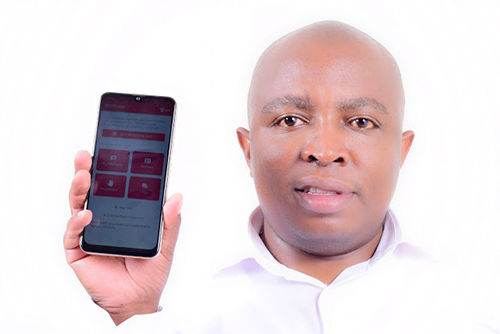Kenyans ingenuity at innovations that help prevent loss of lives and the spread of coronavirus has signalled hope that global problems can be solved by local solutions. From hand sanitisers to ventilators and personal protective equipment (PPEs), local innovators and manufacturers are working hard behind the scenes to beat the pandemic that by yesterday had claimed close to half a million lives across the globe according to the World Health Organization (WHO).
 Three local researchers — Industrial chemist Mr. Donatus Njoroge, IT expert Gideon Kamau, and Physician Scientist Dr. Jesse Gitaka — have developed a Covid-19 tracing system dubbed ‘KoviTrace’ that provides access to all the persons that a patient came into close contact with in the last 14 days.
Three local researchers — Industrial chemist Mr. Donatus Njoroge, IT expert Gideon Kamau, and Physician Scientist Dr. Jesse Gitaka — have developed a Covid-19 tracing system dubbed ‘KoviTrace’ that provides access to all the persons that a patient came into close contact with in the last 14 days.
The system which is available in both English and Kiswahili comprises of an administrative web interface for use by the administrator (Ministry of Health) and a front end system (an application that can be installed on Android phones or accessed via a USSD code by those without smart phones).
PREVIOUS INTERACTIONS
It also provides users with an updated access to WHO’s frequently asked questions about the disease and a self-screening test that gauges the user’s vulnerability to the disease based on his or her previous interactions, behaviour and movements.
The technology can be used by the Ministry of Health in tracing all persons that Covid-19 patients came into contact with, and by Kenyans in establishing if they have been in contact with persons who tested positive.
“Once an individual has tested positive, a Ministry of Health official will only be required to key in his phone number onto the web portal and command it to trace all his contacts within the last 14 days instead of relying on his word of mouth, this process generate a list of all suspected cases” explained Mr Njoroge.
In the app the identified contacts are then immediately contacted via push message.
The alert, received in the form of a text message, also contains information on preventive measures, contacts of the nearest hospital and the emergency toll-free numbers of the respective county Covid-19 coordinator.
CORONAVIRUS SURGE
“This system works for those who have installed the app in their phones or registered through a USSD code,” added Mr Njoroge, who is also the head of innovations, intellectual property and community engagements at Mount Kenya University.
Mr Njoroge said the system can trace every person that the individual has been in contact with virtually, thus minimising the risk of persons going into hiding.
“It uses standard location API’s to calculate the geo-fence of the user at a particular moment, the geo-fence and timestamp are then synced with the user at intervals of three minutes”.
“The identity of the patient is kept anonymous,” Mr Njoroge adds.
With over seven million confirmed infections as per yesterday morning, countries strategising on how to open up their local economies have one major nagging headache — the growing threat of increased local transmissions.
TAMING THE VIRUS
In his much-awaited June 6 speech, President Kenyatta warned that countries that opened up their economies without laying down proper protocols experienced a surge in the number of infections.
The government is conducting contact tracing with the help of NIS through accessing patients’ phone data to trace their last movements, a procedure that is not feasible at large scale, besides being expensive. If ‘KoviTrace’ is approved and adopted for use by the government, Kenya will rank among global economies that have established similar apps for use in taming the virus before reopening the economies.
One such country is Australia, which developed COVIDSafe, an App that is tracing contacts of patients within the last 21 days. For more information contact: dnjoroge@mku.ac.ke or jgitaka@mku.ac.ke
